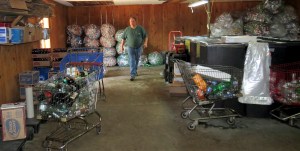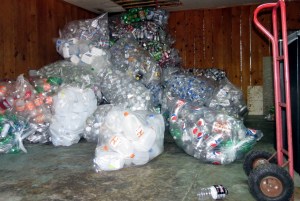NORWAY — An immigrant couple from California put their son, Rogelio Garcia Jr., through college by diving in dumpsters to collect cans and bottles in the middle of the night.
In 2006, ABC News interviewed Garcia, 25, an engineer at a major defense contractor, with a degree from Massachusetts Institute of Technology. He said he was living the American dream thanks to his immigrant parents who turned in cans for cash.
While most people won’t be financing their child’s college tuition with their bottle money, those who cash in returnables can pay for other expenses or contribute the money to a charity.
Maine is one of 10 states that require a deposit on beverage containers. The others are California, Massachusetts, Connecticut, Hawaii, Iowa, Michigan, New York, Oregon and Vermont.
The Maine Returnable Beverage Container Law was enacted in 1976 and implemented two years later to reduce litter and solid waste, and to create incentives for recycling and reuse.
It allows for recycling all beverage containers, except dairy products and unprocessed cider. The law was expanded in 1989 to include wine, liquor, water and nonalcoholic carbonated or noncarbonated drinks.
In Oxford Hills, like other parts of Maine, consumers have the choice of going to a redemption center, donating bottles and cans to a fundraiser, using a system such as Clynk that trades cans and bottles for store credit or simply recycling them at the local waste station.
In Oxford Hills, there are at least three state-licensed redemption centers: Payne’s Redemption Center on Paris Hill Road in Paris, Don’s Redemption Center on Cottage Street in Norway and Fore Street Redemption in Oxford.
Dan Payne has been in the bottle redemption business for the past three decades.
“It’s a lot of hard work,” he said.
The state has no firm numbers on how many cans and bottles recycled annually by Mainers. However, according to a 2002 study, the State Planning Office estimated that nearly 700 million to 750 million containers were sold in the state annually.
The refund process is simple from the customer’s standpoint. Customers come to the redemption center and all Maine-marked containers are redeemed. Customers will be generally get 5 cents for each smaller container and 15 cents for larger containers, such as wine and liquor bottles.
Some redemption centers offer coupons or special days where they increase the redemption price by a penny or so. A redemption center also has the flexibility to add a few pennies more, but never pay less than the face value of the container.
At Payne’s Redemption Center, three full-time and one part-time employee sort the bottles and cans. Once the customer is paid, Payne said a second sorting begins so the redemption center can be reimbursed by the distributors.
“You’re handling cans twice,” Payne said.
Each bottle and can goes back to the original distributor, such as Coca-Cola or Pepsi.
Payne said he is generally reimbursed 8½ cents for each 5-cent can or bottle from the distributor. He gets 18 cents on the 15-cent bottles. The money goes back into the business to pay employees and overhead costs, he said.
Maine’s Returnable Beverage Container Law is under the supervision of the Department of Agriculture.
Business owners are concerned about the ramifications should the law be repealed.
“All that will go to the landfill,” Payne said, pointing to stacks of nonrecyclable plastics such as juice and soda bottles.
Beyond the environmental ramifications, Payne and David Dunn, who sometimes helps at the redemption center, say jobs would be lost and a source for many local fundraising efforts would be gone if the bottle bill is repealed.
Payne’s Redemption Center regularly contracts with local nonprofit organizations to help them raise funds.
For example, the Paris Public Library paid for a new air conditioner through bottle redemption money. More than $300 was earned last year by the West Paris Explorers for their activities. Girls Scouts, Special Olympics and other organizations also benefit from redemption centers.
The money from returnables also helps people pay for everyday living expenses.
Two young men came to Payne’s Redemption Center recently to cash in their cans and bottles.
With $2.85 from their returnables, one of them said he would “probably use it for food.”


Comments are no longer available on this story